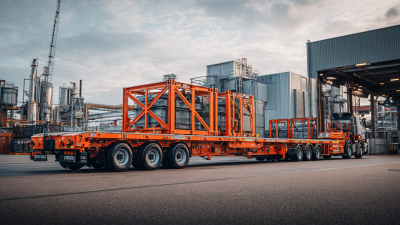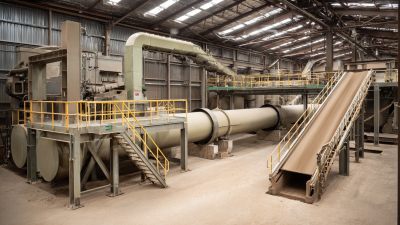strict management, quality first, quality service, and customer satisfaction


When it comes to making water treatment more efficient, High Quality Compact Flotation Units (or CFUs, as folks often call them) really stand out as a game-changer. I’ve seen reports suggesting that the global water treatment market might hit a staggering $750 billion by 2028 — which pretty much screams there's a real need for smarter, more reliable solutions. CFUs are great for that because they boost the separation process while taking up less space, making them perfect for facilities with limited room.

Companies like Shanghai Shangjiang Petroleum Engineering Equipment Co., Ltd. are leading the charge, constantly pushing the envelope with cyclone separation tech to stay ahead of the game, especially in the oil and gas world. Incorporating these compact units not only makes water treatment more efficient but also helps support sustainability efforts by cutting down waste and making better use of resources. Honestly, it’s exciting to see how these innovations are shaping up the future of water management!
High-quality compact flotation units, or CFUs for short, are seriously game-changers when it comes to making water treatment more efficient. One of their coolest features? Their amazing ability to separate out solids and pollutants effectively. Thanks to some pretty advanced flotation tech, these units can produce water that's much purer — making them a no-brainer for all sorts of jobs, like dealing with industrial waste or managing wastewater.
Another thing I really like about CFUs is how space-friendly they are. Unlike those big, bulky flotation systems that gobble up tons of room, these compact units fit neatly into smaller spots — perfect if you're working in a tight space, like a city setting or a crowded plant. Plus, they're designed to be pretty easy to handle. Most come with simple controls and monitoring tools that make operation and maintenance less of a headache. All these features not only boost efficiency but also help cut down on costs and keep everything on the right side of environmental rules.
When it comes to water treatment, the efficiency of flotation systems really makes a big difference. Traditional flotation setups have been around forever and do the job, but honestly, they often aren't the most efficient or space-friendly. They tend to take up a lot of room and need quite a bit of maintenance, which can rack up the operational costs pretty quickly. On the flip side, high-quality compact flotation units bring some pretty impressive perks—like saving space and boosting performance. Thanks to their advanced designs that fine-tune particle separation, these smaller units can handle water with different qualities much better. That means cleaner water and easier process control overall.
A few tips when you're choosing a flotation system:
Think about your specific needs at the facility. If you pick a unit that can adjust its operation, it’ll be more versatile, especially if the water quality varies. Also, keeping an eye on energy use is smart—it helps you save money in the long run.
Plus, these compact units are a breeze to install, especially in tight spots, making them perfect for facilities with limited space. They often start up faster and can be smoothly integrated into your existing setup—definitely a practical choice for tackling today’s water treatment challenges.
Compact flotation units, or CFUs, are actually pretty essential when it comes to making water treatment more efficient. They do a great job of separating out the nasties from the water, which really helps speed things along in the treatment process. Plus, their design keeps the footprint small, so they fit easily into existing setups without needing a bunch of costly upgrades. That’s a huge plus for towns and industries that are tight on space but still want top-notch water quality.
On top of that, CFUs are pretty good for saving energy and cutting down costs. They use some clever tech that boosts how well air bubbles pick up pollutants, which makes the separation process way more effective. So, the treatment doesn’t need to work as hard – meaning less energy used and lower bills. Their compact size also makes them easier to maintain, which cuts down on downtime and keeps everything running smoothly. By using these advanced flotation systems, facilities can boost their performance, stay in line with regulations, and keep everyone safe and healthy — all without breaking the bank.

You know, in the world of water treatment that’s always changing and upgrading, using the latest flotation tech can really make a difference—not just for costs, but also for how smoothly things run. These compact, high-quality flotation units, built with some pretty advanced engineering, help companies separate out contaminants more effectively. Honestly, investing in such tech isn’t just about saving money in the long run; it also boosts the reliability of the entire treatment process. If companies are smart about it and get on board early, they’ll likely see some pretty significant savings down the road—and do their part for more sustainable water management.
Here at Shanghai Shangjiang Petroleum Engineering Equipment Co., Ltd., we’re right in the thick of this movement. We focus on developing innovative separation and filtration gear, especially cyclone separation products, which show how new tech can really shake things up in the oil and gas world. By adopting these advanced flotation solutions, businesses can boost their water treatment game big time—making things more efficient and environmentally friendly. Honestly, choosing top-notch flotation units isn’t just an upgrade; it’s a smart move toward a more efficient, cost-effective future.
It’s exciting to see how these innovations can really turn things around, don’t you think?

Hey, have you heard about those compact flotation units, or CFUs? They’re kind of a big deal these days when it comes to eco-friendly water management. Basically, they help cut down the environmental impact of treating water — I mean, they can remove up to 90% of suspended solids and pollutants, according to this report from the International Water Association. That means cleaner water coming out and less junk going back into rivers and lakes. What's pretty cool is how they do it: by separating contaminants efficiently, they use less water overall and don’t rely heavily on chemicals, which is a big win for protecting aquatic life.
**Pro tip:** When choosing a CFU, it’s smart to look for one that’s scalable and modular. That way, it can handle different sizes of treatment needs and adjust to various wastewater conditions without a hassle.
And here’s some good news — these units aren’t just good for the environment, they also save energy. The Water Environment Federation found that compact systems like these can cut energy use by nearly 30% compared to older, more traditional flotation methods. That means less running costs and better overall efficiency, helping facilities meet regulations while also supporting water conservation goals.
**Another tip:** Don’t forget regular maintenance! Keeping your CFU in check ensures it stays running smoothly for longer and continues to work at its best.
This chart displays the efficiency of compact flotation units in various water treatment scenarios measured in removal efficiency percentage (E%).
: CFUs are advanced systems designed to enhance operational efficiency in water treatment processes by effectively separating contaminants from water.
CFUs streamline the treatment workflow, significantly reduce processing time, and minimize the facility footprint, allowing for easy integration without substantial modifications.
CFUs maximize the contact between air bubbles and pollutants, leading to improved separation rates, which reduces energy consumption during the treatment process.
By reducing energy use and improving separation efficiency, CFUs lower operational costs, making treatment processes more cost-effective and environmentally friendly.
CFUs can achieve up to 90% removal of suspended solids and pollutants, leading to cleaner effluents, reduced harmful discharges, and lesser ecological footprints.
They minimize chemical additive requirements, conserve water, and significantly reduce energy consumption compared to traditional flotation methods.
Potential users should consider scalability and modular design to ensure the CFU can adapt to varying treatment capacities and wastewater conditions.
Implementing regular maintenance schedules is essential to ensure optimal performance and prolong the lifespan and efficiency of CFUs.
Investing in high-quality CFUs leads to long-term savings, improved reliability of the treatment process, and a sustainable approach to water management.
The company focuses on developing innovative separation and filtration equipment, aiming to revolutionize water treatment processes and enhance efficiency in industries like oil and gas.
So, I was reading this article called "Unlocking Efficiency: The Benefits of High-Quality Compact Flotation Units in Water Treatment," and honestly, it really highlights how these little CFUs are a game changer in modern water treatment. Basically, they’re built with features that boost how efficiently everything runs—allowing better removal of contaminants from water. And here's the cool part: compared to the old-school flotation systems, these compact units don’t take up much space and can handle more processing. That makes them a pretty awesome choice for facilities trying to get their water treatment game on point without needing huge setups.
The article also digs into whether investing in these advanced flotation units is worth it financially. Turns out, they don’t just improve water quality—they can actually save money in the long run, which is definitely a bonus. Plus, there's some talk about how environmentally friendly these CFUs are, tying into broader efforts to manage water sustainably. As a company, Shanghai Shangjiang Petroleum Engineering Equipment Co., Ltd. really sees the value here. They’re all about creating innovative separation and filtration gear that not only works well but also supports efficiency and eco-friendliness—especially in the oil and gas world.
All in all, these compact flotation units seem like a smart move for anyone looking to optimize their water treatment process while keeping sustainability in mind.






